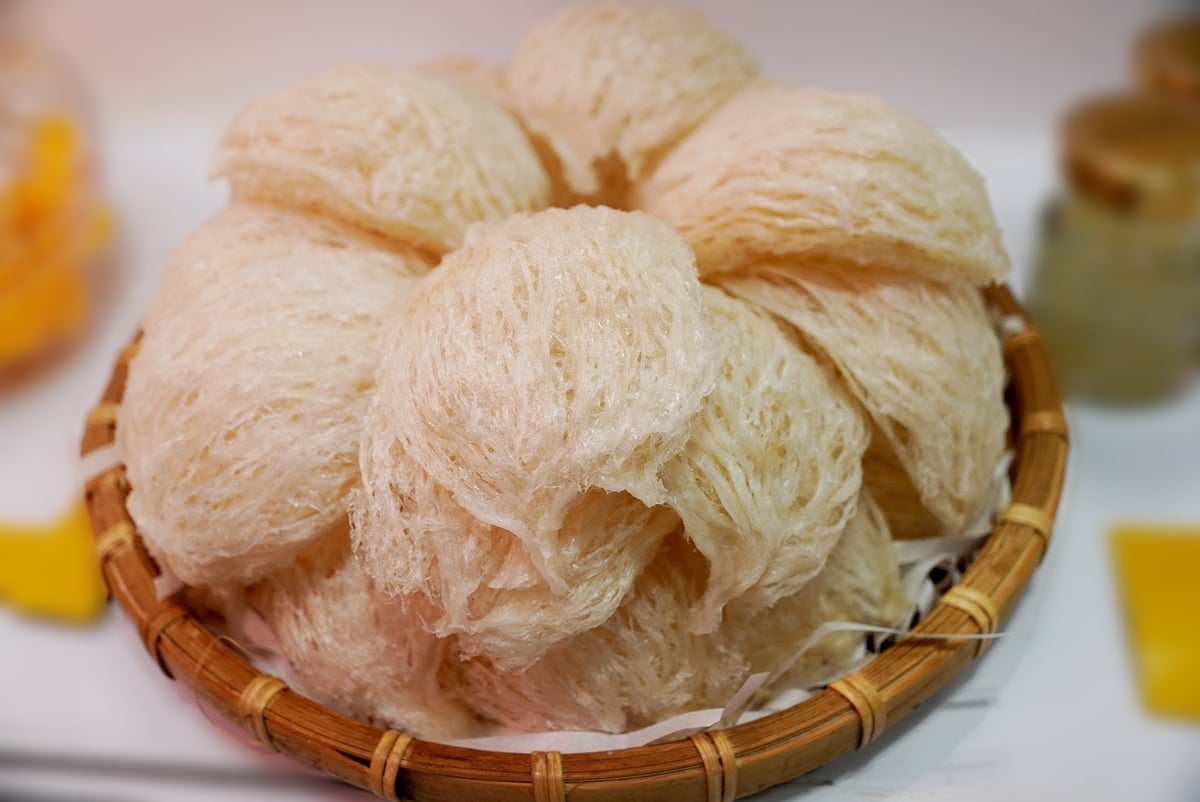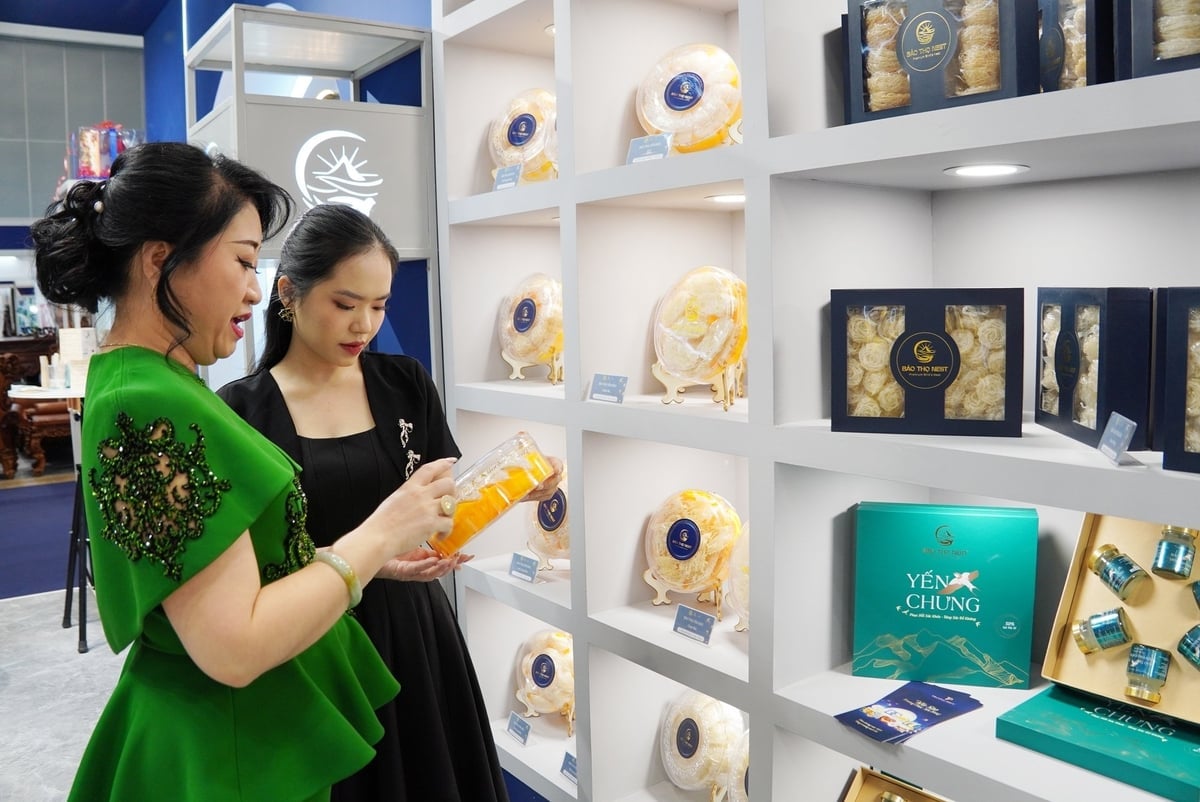December 1, 2025 | 12:01 GMT +7
December 1, 2025 | 12:01 GMT +7
Hotline: 0913.378.918
December 1, 2025 | 12:01 GMT +7
Hotline: 0913.378.918

Vietnam's bird's nest exports to the Chinese market have been growing steadily every year. Photo: Nguyen Thuy.
Vietnam's bird's nest industry is expanding domestically and exporting to global markets, particularly China. There, bird's nests are considered a rare delicacy with high nutritional value and benefit from robust government support.
Vietnam has been exporting bird's nests to China for years, primarily through unofficial channels. However, on November 9, 2022, the Ministry of Agriculture and Rural Development of Vietnam (now the Ministry of Agriculture and Environment - MAE) and General Administration of Customs of China (GACC) performed a protocol regarding the quarantine, inspection, and veterinary hygiene requirements for the export of bird's nests to China. The agreement encompasses two product categories: refined nests and pre-processed bottled nests. This was a significant milestone in the development strategy of Vietnam's bird's nest industry.
MAE's strong leadership, the Department of Livestock Production and Animal Health's efforts, and the determination of bird's nest businesses allowed Vietnam to officially export its first batches of bird's nest products to China on November 16, 2023, in Lang Son Province, after five years of negotiations. Vietnam has gained access to a billion-consumer market as a result of this event.
According to Yang Hsua-Ta, president of the Indonesian Bird's Nest Association, China's imports of bird's nests have been consistently increasing annually. More specifically, China imported 323 tons in 2020, 354 tons in 2021, 495 tons in 2022, and 597 tons in 2023. The number of imports is anticipated to reach 773.5 tons in 2024.
"The Indonesian association president noticed that the industry's strong development potential is evident in the consistent increase in Vietnam's bird's nest exports to China," he said.
The Vietnam Bird's Nest Association's President, Le Thanh Dai, admitted that China is a highly promising market, but it is also rife with challenges, particularly in the face of competitors such as Indonesia and Malaysia, which have over a century of experience in the production and marketing of bird's nests.
China is responsible for 80% of the global bird's nest consumption, with an annual market value of up to USD 8 billion. The country maintains exceptionally stringent quality standards. Currently, most imported bird’s nests in China come from Indonesia and Vietnam. Nevertheless, Vietnam currently contributes only approximately 0.8% of the total bird's nest exports to China, a low figure in comparison to Indonesia, Malaysia, and Thailand, which have the capacity to produce up to 2,000 tons annually.
This demonstrates that the bird's nest industry in Vietnam continues to possess significant development potential, despite the fact that it grapples with significant obstacles. The Vietnam Bird's Nest Association's President underscored the necessity of Vietnam's preservation and promotion of the distinctive flavour of its bird's nests in order to achieve success in the Chinese market.
"The Vietnamese bird's nest industry will find it challenging to compete with more established players if we fail to preserve our quality and unique flavour," stated Le Thanh Dai.

Products under the Bao Tho bird's nest brand are introduced to international partners. Photo: Nguyen Thuy.
Nguyen Nguyen Phuong, Deputy Director of Ho Chi Minh City’s Department of Industry and Trade, cautioned that while China is a high-potential market, it also poses major challenges. Vietnamese bird's nest products may encounter intense competition or, in the worst-case scenario, imitation once the initial export cargoes reach the Chinese market in the absence of a robust brand.
"A single large Chinese enterprise can consume 50 to 60 tons of raw bird's nests annually." He emphasized that Vietnam's bird's nest products can only be sustained and their value increased by establishing a strong brand, which is essential for securing market presence and increasing product value in this billion-consumer market. Most significantly, they must maintain the unique flavour of Vietnamese bird's nests, a characteristic that Chinese experts highly regard.
In addition, numerous organizations within the sector are currently in the process of evolving. According to Luu Ngo Phuong Quynh, Director of Nha Yen Viet Co., Ltd., China is a market that has immense potential. Export permits, particularly for the Chinese market, continue to pose an immense obstacle, despite the organization's adequate production capacity and internationally accredited product quality.
"We are making every effort and have received assistance from the appropriate authorities." Ms. Quynh stated, "We are currently awaiting approval from Chinese Customs to allow our Truong Tho bird's nest brand to enter this vast market." She also observed that the company's swiftlet residences are currently primarily located in Khanh Hoa Province; however, there are plans to expand to Can Gio in order to satisfy the increasing market demand.
According to Le Thuy Chi, CEO of Can Gio Island Bird's Nest Company, the organization has made substantial strides in the past year, achieving a refined bird's nest output of one ton, an annual production of one million jars, and the introduction of numerous new products. Additionally, the organization has obtained international certifications, including ISO 22000:2018, US FDA, and HACCP.
"We are currently in the process of creating more mainstream product lines that are specifically designed for various export markets." For instance, the Chinese market favours refined nests, raw nests, and preserved nests, while South Korea has a robust demand for innovative products such as bird's nest jelly and whole nests, as Ms. Le Thuy Chi explained.
Translated by Linh Linh

(VAN) The signing of a protocol between Viet Nam and China on the export of fresh jackfruit represents a significant milestone in agricultural trade cooperation between the two countries.

(VAN) On November 27, the Ninh Binh Department of Agriculture and Environment and the Institute for Green Growth Research organized a training course on greenhouse gas inventory for businesses.

(VAN) China’s cooking oil is suddenly flooding into India. It all comes down to a soybean surplus that Beijing doesn’t quite know what to do with.

(VAN) An Giang promotes supply-demand connections, standardizes quality and builds value chains, creating a foundation for sustainable bird’s nest development and aiming to expand exports.
/2025/11/24/5339-4-nongnghiep-075331.jpg)
(VAN) Recently, the conference on 'Sustainable Fisheries Linkage Chain - Tilapia for Export' took place in Tien Hai commune, Hung Yen province.
/2025/11/21/4309-2-153400_128.jpg)
(VAN) Green and low-emission rice is paving the way for Vietnamese rice to enter high-end markets, marking the beginning of a transformation journey toward greening and elevating the national rice brand.

(VAN) ‘Right to Win’ outlines a national action plan that shapes a new vision for Viet Nam’s agriculture in an era of renewal and global integration.